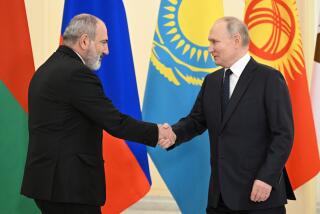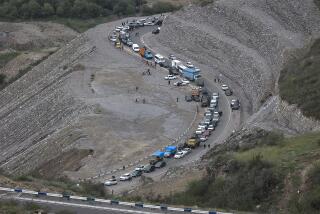Armenia Officials Reassert Independence : Soviet Union: A gradual move toward freedom is endorsed. Azerbaijan’s president says regional strife threatens all his people.
- Share via
MOSCOW — Armenian lawmakers voted Tuesday in favor of a declaration reasserting their homeland’s independence.
In neighboring Azerbaijan, President Ayaz N. Mutalibov said regional strife has reached such a pitch that the entire population of the republic is threatened.
Against a background of renewed guerrilla attacks by Azerbaijani and Armenian vigilantes, the Armenian Supreme Soviet, the republic’s Legislature, approved a preamble and 10 articles of a “Declaration on Armenia’s Independent Statehood,” said Ovanes Muradyan of the Armenian National Movement.
The declaration casts aside the Communist-inspired label of Armenian Soviet Socialist Republic and renames the mountainous land of 3.5 million people the Republic of Armenia. This is the name Armenia had from 1918 to 1920, before the Bolsheviks took power.
Article 1 of the declaration announces the start of a gradual process toward independence, putting the government in Yerevan, the republic’s capital, on the course chosen by Latvia and Estonia.
The declaration provides for locally controlled “security forces” to protect Armenia and its people and, despite appeals and decrees from Soviet President Mikhail S. Gorbachev, envisages a separate currency, tax system, customs service and banks.
The Armenian Supreme Soviet was to be reconvened today to vote on an 11th article that would make the declaration the basis for a new constitution, and possibly on a 12th clause condemning the genocide of Armenians at the hands of the Ottoman Turks. A vote on the declaration as a whole will also be taken.
In Azerbaijan, Mutalibov, who is also head of the republic’s Communist Party, said in a televised speech that his government will have to act to protect Azerbaijan’s sovereignty in the face of renewed attacks by Armenians.
Tass, the official Soviet news agency, said the speech followed “dramatic aggravation of the situation on the Armenian-Azerbaijani border” in recent days.
In July, Gorbachev ordered the ethnic-based irregular armies disbanded by force if they failed to do it voluntarily, but Armenia’s new president, Levon Ter-Petrosyan, persuaded Moscow-based officials to extend the deadline by two months while he works to bring these elements under the control of the Armenian Supreme Soviet.
Referring to armed attacks over the weekend and attacks on a bus and villages in Azerbaijan, Mutalibov called Gorbachev’s flexibility a mistake.
Mutalibov said the existence of Azerbaijan’s 6.9 million people has been endangered and that Azerbaijan may appeal for “international solidarity.” He was not specific but may have been referring to ethnic Azerbaijanis in Iran; to Turkey, with whom Azerbaijanis share linguistic and historical ties, or to other Muslim peoples. Most Armenians are Christian.
The rugged Transcaucasus region has been on the boil for more than 2 1/2 years because of a bitter territorial dispute over which of the two republics should govern the autonomous region of Nagorno-Karabakh, a mostly Armenian enclave surrounded by Azerbaijan.
More to Read
Sign up for Essential California
The most important California stories and recommendations in your inbox every morning.
You may occasionally receive promotional content from the Los Angeles Times.










